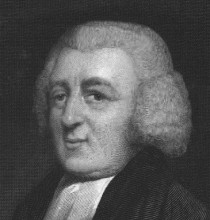
Born in London in 1725, deprived of the godly influence of his mother before he was seven years old, John Newton was but two years at school before he went, at the age of eleven, on his first voyage with his father, a sea captain. From that time till the age of thirty, when his health was broken by a stroke, Newton endured the wild rigours of a life before the mast, including being press-ganged aboard a naval vessel and flogged when captured after desertion. Only his love for the youthful Mary Catlett preserved him from suicide. He was released from the navy only to join in the slave traffic across the Atlantic, and was reduced almost to death on the Guinea coast before being delivered by a friend of his father’s.
Throughout these sad events there ran a divine purpose; and while Newton forgot the Saviour whom his mother had so often commended to him in childhood, and while he became, like one of old, a ‘blasphemer and injurious,’ it was all leading to a day – in the midst of a tremendous storm at sea – when he was brought to say: ‘I stood in need of an Almighty Saviour, and such a one I found described in the New Testament. The Lord had wrought a marvellous thing.’
After Newton ended his seafaring days he became tide-surveyor in Liverpool, a thriving slave port with a population of 22,000. It was here that Newton first heard the great evangelist, George Whitefield, and soon he came to know other leaders of the Evangelical Revival such as William Grimshaw and Henry Venn. His own thoughts were now turned to the ministry, and after several disappointments he was at length settled in 1764 in the Buckinghamshire parish of Olney – a name immortalized by the hymns which he and the poet William Cowper wrote for their mid-week meetings.
In his sixteen years at Olney, Newton found a good field for exercising his gift as ‘the letter writer par excellence of the Evangelical Revival’. The dreadful condition from which he had been saved, the long struggle he went through before he came to a clear understanding of the gospel, and the years of patient waiting for an opening in the Church, all served to prepare Newton for this work. He was given a thorough knowledge of the workings of the human heart and of the Lord’s dealings with his people.
Newton became minister of St. Mary Woolnoth, London, in 1779, where he continued to preach until almost the end of his life in 1807. Being advised by Richard Cecil in 1806 to discontinue preaching, he gave the memorable reply. ‘I cannot stop. What! shall the old African blasphemer stop while he can speak?’
In addition to various collections of his letters, the Trust publishes The Life of John Newton by Josiah Bull and his collected Works.
